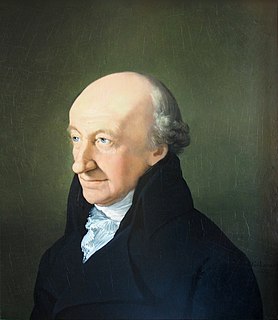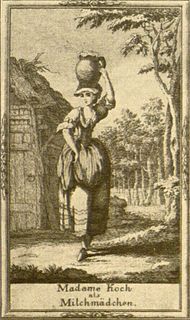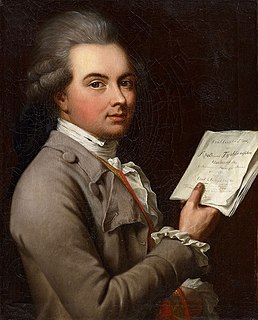
Christoph Martin Wieland was a German poet and writer. He is best-remembered for having written the first Bildungsroman, as well as the epic Oberon, which formed the basis for Carl Maria von Weber's opera of the same name. His thought was representative of the cosmopolitanism of the German Enlightenment, exemplified in his remark: "Only a true cosmopolitan can be a good citizen."

Opera in German is that of the German-speaking countries, which include Germany, Austria, and the historic German states that pre-date those countries.

Anna Amalia of Brunswick-Wolfenbüttel, was a German princess and composer. She became the duchess of Saxe-Weimar-Eisenach, by marriage, and was also regent of the states of Saxe-Weimar and Saxe-Eisenach from 1758 to 1775. She transformed her court and its surrounding into the most influential cultural center of Germany.

Anton Schweitzer was a German composer of operas, who was affiliated with Abel Seyler's theatrical company.

Georg Anton Benda was a composer, violinist and Kapellmeister of the classical period from the Kingdom of Bohemia.

Günther von Schwarzburg is a Singspiel in three acts by Ignaz Holzbauer set to a German libretto by Anton Klein. Loosely based on events in the life of the 14th-century German king, Günther von Schwarzburg, the opera premiered on 5 January 1777 at the Hoftheater in the Mannheim Palace.
Erwin und Elmire is a singspiel, described as a Schauspiel mit Gesang, in two acts by the German composer Johann André, with a libretto by Johann Wolfgang von Goethe, after Oliver Goldsmith's ballad of Angelica and Edwin, The Hermit, in chapter 8 of his sentimental novel The Vicar of Wakefield.

Friederike Sophie Seyler was a German actress, playwright and librettist. Alongside Friederike Caroline Neuber, she was widely considered Germany's greatest actress of the 18th century; Gotthold Ephraim Lessing described her in his Hamburg Dramaturgy as "incontestably one of the best actresses that German theatre has ever seen."

Abel Seyler was a Swiss-born theatre director and former merchant banker, who was regarded as one of the great theatre principals of 18th century Europe. He was "the leading patron of German theatre" in his lifetime, and is credited with introducing Shakespeare to a German language audience, and with promoting the concept of a national theatre in the tradition of Ludvig Holberg, the Sturm und Drang playwrights, and German opera. Already in his lifetime, he was described as "one of German art's most meritorious men."

The Seyler Theatre Company, also known as the Seyler Company, was a theatrical company founded in 1769 by Abel Seyler, a Hamburg businessman originally from Switzerland who became "the leading patron of German theatre" in his lifetime. It was largely a continuation of the Hamburgische Entreprise, whose dramaturge was Gotthold Ephraim Lessing and whose main owner was Seyler. The Seyler theatrical company became one of the most famous theatrical companies of Europe in the 18th century, attracting some of Germany's leading actors, playwrights and composers. It originally comprised around 60 members, including an orchestra, a ballet, house dramatists and set designers. Between 1777 and 1778 Seyler employed some 230 actors, singers and musicians. The company was originally contracted by the Hanoverian court with performing at Hanover and other cities of the kingdom. The company would eventually perform all across Germany, and performed for three years at the Weimar Schlosstheater, invited by Duchess Anna Amalia of Brunswick-Wolfenbüttel. When Anna Amalia succeeded in engaging the Seyler Company, this was "an extremely fortunate coup. The Seyler Company was the best theatre company in Germany at that time." The company had an important role in the development of German opera in the late 18th century.

Oberon, or The Elf King, or simply Oberon, originally known as Huon and Amanda, is a romantic Singspiel in five acts by Friederike Sophie Seyler, based on the poem Oberon by Christoph Martin Wieland, which itself was based on the epic romance Huon of Bordeaux, a French medieval tale. It has been named for two of its central characters, the knight Huon and the fairy king Oberon, respectively.
Der Stein der Weisen, oder die Zauberinsel is a two-act singspiel jointly composed by Johann Baptist Henneberg, Benedikt Schack, Franz Xaver Gerl, Emanuel Schikaneder, and Wolfgang Amadeus Mozart in 1790. The libretto was written by Schikaneder.
Karl Siegmund von Seckendorff was a German military officer, poet, and composer.
Karl Alexander Herklots was a German lawyer, chiefly remembered since his death as a theatre librettist and translator.

Franziska Romana Koch, née Gieraneck, Giwraneck, Giraneck, Jiránek (1748–1796) was a German ballet dancer, soprano, and actress. First a dancer as the member of the theatre company Kochische Gesellschaft, she also trained her voice and worked at the court theatre of Weimar. Anton Schweitzer composed the opera Alceste for her, and its librettist Christoph Martin Wieland celebrated her performance in the title role in a poem. She later worked in Gotha, and finally in Leipzig as a member of Bondini's company, where she retired in 1787.
Simone Schneider is a German operatic soprano. As a member of Staatstheater am Gärtnerplatz, she performed coloratura roles such as the Mozart's Queen of the Night. As a member of the Staatsoper Stuttgart from 2006, she has performed a wide range of leading roles including Donizetti's Maria Stuarda and the Feldmarschallin in Der Rosenkavalier by Richard Strauss. She performed as a guest in major opera houses in Germany and Europe.
Rosamunde is a singspiel by Anton Schweitzer to a German-language libretto by Christoph Martin Wieland for the Seyler theatrical company of Abel Seyler, premiered 20 January 1780, at the Nationaltheater Mannheim. The singspiel was revived by the 60th Schwetzingen Festival in 2012 in a production by Jens Daniel Herzog.

Ernst Christoph Dressler was a German composer, operatic tenor, violinist and music theorist. A self-taught singer and violinist, he became a musician at several courts before he moved to the Court Opera in Vienna and finally to Kassel. He is known for a march on which Beethoven based his first published composition.
Philipp Christoph Kayser was a German pianist, composer, orchestra musician, music teacher and poet. He was a close friend of Johann Wolfgang von Goethe.













